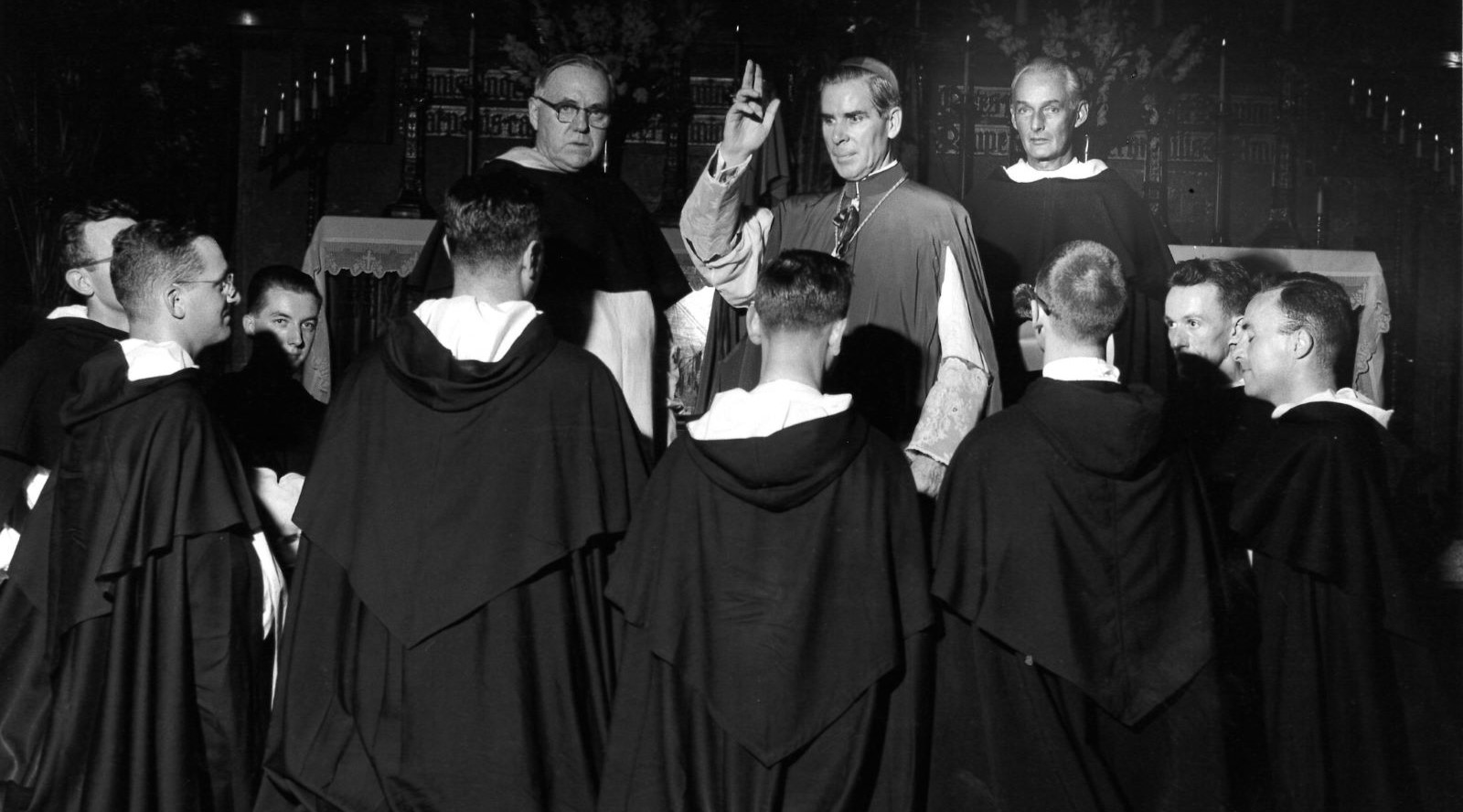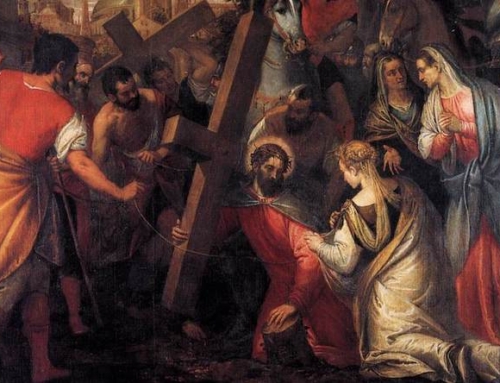This is part of a series entitled, “Preaching: Feeding Fellow Beggars.” Read the series introduction here. To see other posts in the series, click here.
In America, few Catholic preachers have ever claimed national attention and love like Bishop Fulton Sheen. Though he died over 40 years ago, his name is still well-known today—to say nothing of his immense popularity during his lifetime. The author of numerous books and articles, a wildly famous television producer, and highly sought after for his retreats and Lenten sermons, Fulton Sheen truly was America’s Preacher.
But what made Sheen so popular and impactful, so much so that his viewership beat out Milton Berle, “Mr. Television” himself? The answer is simple, really. Fulton Sheen taught the truth of the Gospel and preached Christ crucified. He spoke directly to an age that was being rocked by change and losing its faith. As a teacher, Sheen instructed millions in the truths of the Catholic Faith. As a preacher, Sheen moved hearts and led many to embrace or re-embrace Christ as Lord and Savior. When one looks at his life and work, three themes especially stand out: the missions and evangelization, the daily Holy Hour, and the cross of Christ. These were some of his greatest ideals and loves; they can be ours too.
In his autobiography, Treasure in Clay, Sheen remarks on how much he enjoyed his time as a teacher. He taught at The Catholic University of America for over 20 years, until he was made a bishop in 1951. He never really stopped teaching, though. He just changed the mode of communication from classroom to broadcast. Sheen was a dynamic and engaging teacher, in part due to his natural charisma but probably more due to his careful and diligent preparation. He would thoroughly memorize each of his lectures, fondly recalling an old Irish woman who said to him once, “Glory be to God, if he can’t remember it, how does he expect us to?” (Treasure in Clay, 57).
Sheen was always mindful of his audience and truly desired that they understand what he was teaching. He made every effort to grab their attention with humor, stories, and practical applications. His sense of responsibility as a transmitter of truth explains his widespread popularity and effectiveness. He was not afraid to engage with the real intellectual dangers of his time—communism, relativism, atheism. Speaking out against these ideologies earned Sheen many enemies, but also won him many converts to the Faith.
The time spent as a lecturer prepared him well for his broadcasting ministry, which he approached with a teacher’s mind. While many non-Catholics watched and enjoyed his shows, Sheen noted that his shows were primarily for the education of Catholics. He wanted Americans to have a deeper understanding of their faith. And while so many enjoyed his wit and humor, it was the depth of his message that touched people. They found in Sheen’s program something which spoke to their hearts. They heard that their lives were worth living. They heard about Jesus.
If you were to watch any of Fulton Sheen’s videos or listen to his sermons, you would find a great variety of subjects addressed, but you would also discover a profound simplicity. Fulton Sheen always preached Jesus Christ, his Church and his cross. Few people heard Sheen and remained unmoved, such was his candor, style, and zeal. It is fitting, then, that he would devote so much of his life to the missions and be known as a great maker of converts. I think that Sheen’s success at evangelization, on both large and small scales, is due to nothing else than his single-minded focus on Christ. In his conversations with fans, friends, and strangers, Sheen always pointed them to the truth of Christ. Over the course of his life, Sheen instructed hundreds of converts, using all of his natural talents—his wit, charm, and intellect—in service to the Gospel and for the conversion of sinners.
From where did he draw such strength and conviction? Sheen is perhaps most famous for promoting priestly devotion to the daily Holy Hour. This time, ideally spent before the Blessed Sacrament, was absolutely necessary for Sheen and was his most emphatic recommendation to priests: “Every retreat for priests that I ever gave had this as a practical resolution” (204). In order that his priestly love not run dry, the Holy Hour was an indispensable means for greater intimacy with Christ. Sheen similarly recommended that the laity aim for at least 15 minutes of quiet prayer before the Lord. Many people, priests and laity alike, wrote to Sheen recounting the healing and strengthening effects of that time spent in prayer.
Finally, Fulton Sheen preached the cross, without which we can never really know Christ or the redemption he won for us. Sheen recounts his dismay during a visit to a jeweler he knew well: the jeweler offered him a bunch of silver crucifixes, sold to him by Christians who thought “wearing the crucifix separated them from the world” (289). But that’s just the point! We are supposed to die to the world and be crucified with Jesus. By the cross we remember our redemption and the future life that Christ has won for us. Without the cross, we are not saved. To those who sought to leave the cross behind, Sheen would recall the mocking words addressed to our Lord: “Save yourself, come down from the cross!” (Mark 15:30). How sad if Christ had abandoned his cross and our salvation, if he had saved himself and not us! Thus, Sheen called all to embrace and even love the cross as the means to our salvation. And he practiced what he preached, bearing great physical and emotional suffering in his own life.
In every age, the Lord raises up preachers and prophets to courageously oppose the errors of their times and proclaim the truth of Jesus Christ. The problems that Fulton Sheen diagnosed in the middle of the 20th century have only continued to fester. In our culture today, atheism runs rampant, people are comfortable but not happy, and few know Christ or his cross. In some ways, we are more connected than ever, and yet we are profoundly disconnected from our own spiritual lives. To face these issues in ourselves and in our country, we ought to turn to Fulton Sheen for guidance. In response to atheism, he taught the intelligibility of God’s existence. In response to burnout, despair, and loneliness, he preached the Holy Hour. And before the whole world he announced salvation through no other name than Jesus Christ. Today, Fulton Sheen remains an enduring figure in the American Church. His cause is open for canonization, and his prophetic voice continues to echo through his work. America’s Preacher still has much to say. We would do well to heed his words.
✠
Photo from The Province of St. Joseph (used with permission)







